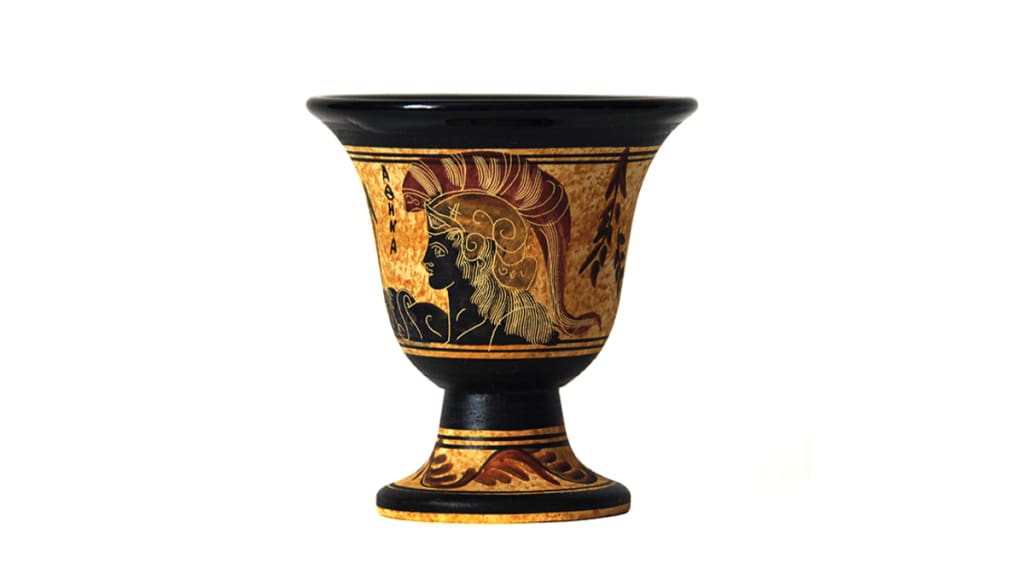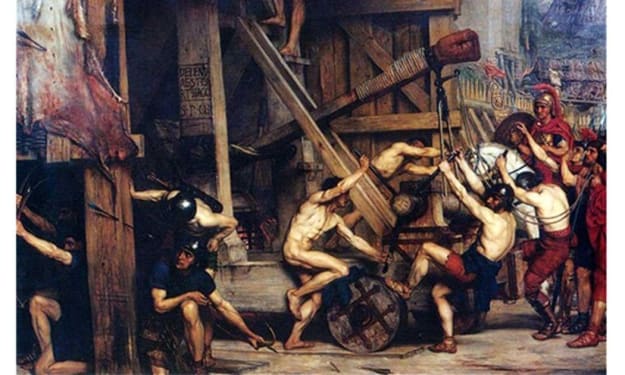
In the golden age of ancient Greece, where philosophy and science flourished, the brilliant mind of Pythagoras conjured up one of the most intriguing and clever inventions: the Pythagorean Cup. This deceptively simple drinking vessel, with its profound moral lesson and ingenious design, reflects the blend of intellectual curiosity and practical wisdom that characterized Greek thought.
Imagine a bustling symposium in ancient Greece, where philosophers, poets, and statesmen gather to discuss the mysteries of the universe over wine and good cheer. Among the many cups on the table, one stands out—the Pythagorean Cup, also known as the Greedy Cup. At first glance, it appears to be an ordinary drinking cup, yet it harbors a secret that would surprise and educate its users.
The Pythagorean Cup was designed by Pythagoras, the famed mathematician and philosopher, to teach a lesson about moderation and greed. The cup features a central column rising from its base, hollowed out and connected to a concealed channel leading to the bottom of the cup. When the cup is filled only to a certain level, it functions like any other cup, allowing the drinker to enjoy their beverage. However, when filled beyond this designated level, the liquid is forced through the hidden channel and spills out from the bottom, leaving the greedy drinker with nothing.
Picture the scene: a guest at the symposium, unaware of the cup's secret, fills it to the brim in their eagerness. Suddenly, to their astonishment, the wine drains away, teaching them a memorable lesson in moderation. The Pythagorean Cup is a marvel of both engineering and philosophy, embodying the principle of balance that Pythagoras held dear. It serves as a tangible reminder of the dangers of excess and the virtues of restraint.
This clever invention demonstrates the ancient Greeks' profound understanding of fluid dynamics and siphoning principles. The design of the Pythagorean Cup is deceptively simple yet remarkably effective, showcasing the ingenuity of Greek engineers and mathematicians. It also illustrates how the Greeks used everyday objects to convey philosophical teachings, blending practicality with deeper moral insights.
The legacy of the Pythagorean Cup extends beyond its immediate practical use. It has become a symbol of ancient Greek wisdom, representing the idea that intellectual pursuits and moral teachings can be interwoven with everyday life. This little cup, with its hidden mechanism, has fascinated and inspired people for centuries, from curious students to modern engineers.
As we explore the realm of ancient Greek wisdom, it becomes evident that the Pythagorean Cup was not just a vessel but a tool for teaching and reflection. The meticulous craftsmanship of these cups highlights the Greeks' commitment to both aesthetics and functionality. Their approach to design combined practical skills with philosophical insights, creating objects that were both beautiful and thought-provoking.
Today, the legacy of the Pythagorean Cup endures. The remnants of these ancient tools, housed in museums and studied by historians and scientists, offer a glimpse into the sophisticated understanding of physics and philosophy held by ancient Greeks. Modern replicas and experiments provide insights into the principles behind these cups, highlighting the advanced knowledge possessed by Greek thinkers.
As we delve into the mysteries of the Greek Pythagorean Cup, we invite you to embark on this journey through time and space. Discover how an ancient philosopher's insight into human nature and physics created a tool that continues to educate and entertain.
From the lively symposiums of ancient Greece to modern classrooms and museums, the story of the Pythagorean Cup continues to captivate and inspire. It serves as a reminder of our shared heritage and the remarkable feats of those who came before us. As we marvel at modern technological innovations, let us honor the pioneers who first dared to blend science with everyday objects, creating tools that teach timeless lessons.
Join us in celebrating the legacy of the Pythagorean Cup and its enduring impact on both philosophy and science. Every sip, every ingenious design from the ancient world is a link in the unbroken chain of human creativity and wisdom—a chain that stretches from the philosophical gatherings of ancient Greece to the innovative minds of today.
By appreciating and understanding these ancient contributions, we not only honor the ingenuity of our ancestors but also inspire future generations to continue exploring, questioning, and innovating. Let us keep the spirit of discovery alive, kindled by the brilliant minds who first dared to fuse practical tools with profound teachings.
If you enjoyed this story, please like, comment, and share. Your engagement helps us explore and uncover more fascinating tales from history.
About the Creator
Marveline Merab
“History never repeats itself. Man always does.”
― Voltaire
Enjoyed the story? Support the Creator.
Subscribe for free to receive all their stories in your feed. You could also pledge your support or give them a one-off tip, letting them know you appreciate their work.






Comments
There are no comments for this story
Be the first to respond and start the conversation.